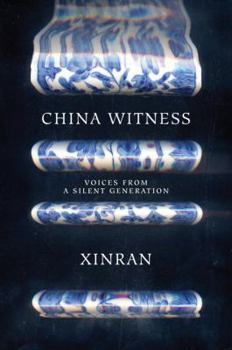China Witness: Voices from a Silent Generation
Select Format
Select Condition 
Book Overview
Para elucidar a formação da China contemporânea, Xinran foi em busca de homens e mulheres comuns com mais de setenta, oitenta anos (um deles tinha 97 e havia participado da Grande Marcha de Mao... This description may be from another edition of this product.
Format:Hardcover
Language:English
ISBN:0375425470
ISBN13:9780375425479
Release Date:February 2009
Publisher:Pantheon Books
Length:434 Pages
Weight:1.60 lbs.
Dimensions:1.4" x 6.4" x 9.4"
Customer Reviews
4 ratings
worth reading
Published by Thriftbooks.com User , 15 years ago
This is not exactly the kind of page turner. At times, there is no story line or you lose track of it easily. But it is a weighty work and valuable for the amount of research the author put into. The author clearly identifies with the silent generation and poured her heart into the writing of it. Read it, and you will not fail to be touched.
Stupendous effort - but limited to interested parties
Published by Thriftbooks.com User , 15 years ago
Xinran Xue's efforts to elucidate China's past 50 years, by interviewing various members of the older generation, is a good read for Sinologists, curious souls like me, and Chinese abroad who'd like to know their own people, history and culture. Under "curious souls", I would include those who are still interested in Communism and its effects, those who wonder what China is - and was; how Chinese men and women think about everyday things. The gender roles and male domination of China is an interesting facet brought up frequently by this author. A good chapter on this is the story of a husband and wife who did the land surveying of the Gobi during the 50's and 60's, far in the miserable hinterlands. The wife's account of her early years in this unusual place and job (esp. for a woman!) is modest and straightforward: what they did, how they did it, how few the materials, how poor the people, how harsh the weather, etc. Then they interview her husband, who did the same work, and he's completely full of himself, his titles and so on, rather than discussing what he actually did, how he lived, what and how he ate, and other down-to-earth real details of 1950's China expansion into the oil business. The writing style is nonfiction, yet personal, and if anything, I'd suggest the author use more photos if she publishes any further stories about the older folks of China. We in the West often have no real idea of how the people were living, eating, dressing, etc. unless we see the photos in addition to reading the books. The sexual modesty of China also comes through in a very strong way, although it's much looser now. Perhaps I can find more such photos and stories online, esp. old missionary photos are available. But the big advantage to this book is that it is written by a real Chinese, who spoke the language(s), and who was trusted by the people she interviewed - rather than a foreigner's view. Her somewhat love=hate relationship with her motherland amuses me.
Xinran
Published by Thriftbooks.com User , 15 years ago
Xinran is the author's nom de plume according to Economist newspaper, Feb. 21, 2009, p. 85. Economist states that her real name Xinran Xue. Certainly the voice of the people is going to be myopic but it is the pulse of the country and should be valued, and treasured, for being just that.
Interesting, but Limited Information
Published by Thriftbooks.com User , 15 years ago
Xinran traveled across China in 2005-06 seeking out the men and women who had experienced the vast changes of the modern era. She tells the stories of 20 ordinary people, average age in their 70's. Unfortunately, the information volunteered by these people is limited - partly because of their likely lack of broader knowledge, and mostly due to cultural reticence. As early as the second millennium B.C., a Chinese criminal's family was punished as harshly as the criminal himself. Around 100 B.C. the people were grouped in units of 5 and 10 households, carrying out mutual surveillance and mutually responsible for each other's conduct. In the case of minor offenses, the criminal's family would be exterminated to between 3 - 5 degrees of association; with serious offenses this was extended to 9 - 10. This principle remained a mainstay of the Chinese judicial system until 1911, and also gave rise to powerful traditions of clan loyalty and fear of speaking out openly that is still an inhibition today. Even media in today's China base reporting in line with this fear. Interviewees are often "led" to follow the central ideology of the party and to express personal views defined by these principles. Thus, Xinran's accounts from those in the Cultural Revolution, the Great Leap Forward, the Long March, etc. is not able to convey the immensity of these tragedies. Notheless, some of the interviews were of particular interest. One first involved a teacher at a Gobi Desert construction/military site. She received no raises for 30 years, supervised self-study until 11 P.M., and sometimes helped the children home during severe weather. Desks were made from mud covered with straw. Altogether, incredible indicators of internal strength and stoicism. However, for broader perspectives I recommend "Mao," by Jung Chang, and "Chinese Lessons," by John Pomfret.






